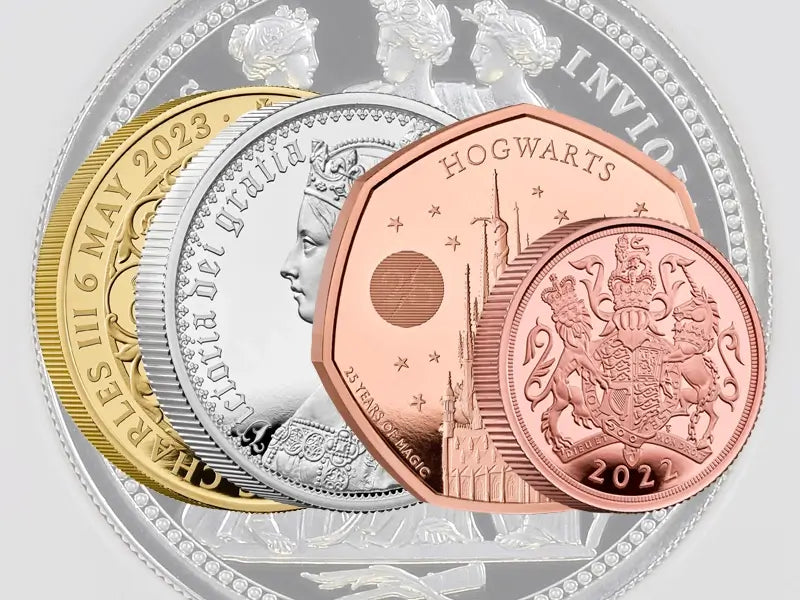
Capital Gains Tax on Gold & Silver UK – Complete Guide
Share
Capital Gains Tax (CGT) is a topic every UK-based gold and silver investor should understand. Whether you're collecting rare coins, investing in bullion, or buying graded proof sovereigns, knowing how CGT applies can help you invest more tax-efficiently and avoid unexpected liabilities.
In this comprehensive guide, we'll explain how CGT works, which precious metals are exempt, how HMRC calculates gains, and how to structure your portfolio to reduce or avoid CGT altogether.
What Is Capital Gains Tax?
Capital Gains Tax is a tax on the profit (or 'gain') you make when you sell or dispose of an asset that’s increased in value. In the UK, CGT applies to various asset classes, including property, shares, and some types of precious metals and coins.
CGT Threshold 2024–25
As of the 2024–2025 tax year:
- The annual CGT allowance (tax-free threshold) is £3,000 for individuals
- Any gains above this are taxed at:
- 10% for basic-rate taxpayers
- 20% for higher and additional-rate taxpayers
Is Gold Subject to Capital Gains Tax in the UK?
It depends on the form of gold you own. Here's a breakdown:
CGT-Exempt Gold Coins
The following coins are exempt from Capital Gains Tax in the UK because they are classified as legal tender by HMRC:
- Gold Sovereigns
- Gold Britannias
- Some other UK-issued gold coins with legal tender face value (e.g. certain Queen’s Beasts and Commemorative £5 coins)
That means if you sell a 2022 Gold Proof Sovereign for a profit, no CGT is due, regardless of the amount.
CGT Applies to Non-Exempt Gold
Examples of gold investments that do incur CGT:
- Gold bars and bullion not classed as legal tender
- Foreign gold coins (e.g. Krugerrands, US Eagles)
- Gold ETFs or paper gold assets
Is Silver Subject to CGT?
Coins such as the silver Britannia, silver Queen’s Beasts, and Una and the Lion (when issued by the Royal Mint as UK legal tender) are exempt from Capital Gains Tax - just like their gold counterparts - because they're classed as legal tender by HMRC.
It’s only non-legal tender silver, such as:
- Foreign silver coins (e.g. American Silver Eagles, Canadian Maple Leafs)
- Silver bars
- Bullion not issued as UK currency
How HMRC Calculates CGT on Precious Metals
HMRC applies CGT based on your gain, not your sale price. Here’s how it works:
Gain = Sale Price – Purchase Price – Allowable Costs
Allowable costs may include:
- Dealer fees
- Grading or certification charges (if proven to add value)
- Shipping or insurance directly linked to the purchase or sale
Once your total gains in a tax year exceed the annual allowance (£3,000), you must report them and pay CGT accordingly.
Tax-Efficient Investing Tips
1. Focus on CGT-Exempt Coins
Build your portfolio around coins like:
- UK Gold Proof Sovereigns
- UK Gold Britannias
This allows you to realise gains without triggering tax obligations.
2. Use Your CGT Allowance Each Year
Even if you invest in CGT-liable assets, you can sell strategically to use your annual £3,000 tax-free allowance.
3. Split Ownership (Spouses & Civil Partners)
Spouses and civil partners each have their own CGT allowance, allowing you to jointly realise £6,000 of gains tax-free annually.
4. Consider Gifting or Estate Planning
Gifting coins may trigger CGT, but it can also be a strategic way to reduce estate tax exposure or spread gains over multiple individuals.
Reporting CGT to HMRC
If your total gains exceed the annual exemption, you must report and pay CGT via:
- Self-Assessment Tax Return
- Real-Time Capital Gains Tax Service on the HMRC website
Penalties and interest apply if you fail to report taxable gains within deadlines.
Summary – Key Takeaways
- UK gold sovereigns and Britannias are CGT-free as they’re legal tender
- Silver is always subject to CGT, regardless of origin
- Use your £3,000 annual CGT allowance strategically
- Keep accurate records of purchases, sales, and any associated costs
- Focus on graded, CGT-exempt coins to simplify your portfolio
Still unsure about the CGT status of a specific coin? Contact Sovara Coins and we’ll help clarify your position.




